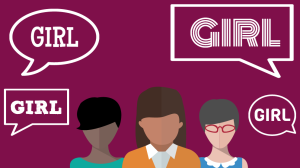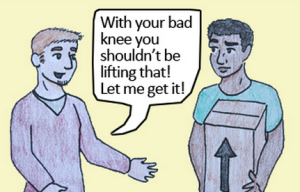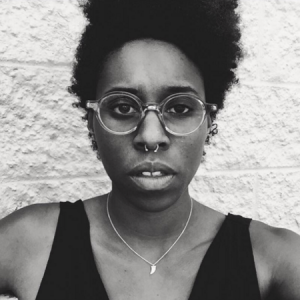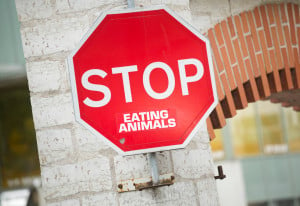
Source: It’s Never 2 Late
You judge people.
I’m not judging you for it. I do it, too.
And judging people for judging people is a rabbit hole I don’t plan on going down.
But how many of the judgments that you make about other people based on appearances alone are likely to be accurate, kind, or worthwhile when they don’t meet the standards you place on yourself?
More to the point, how useful are the judgments you might make based on standards set by your parents, friends, or culture?
If your answer is “not very useful at all,” then you already know what’s up.
So why might you (or I, or anyone) still have lingering, useless judgments about the bodies adorning magazine covers, moving past you on the street, or staring back at you in the mirror?
Now if you’re someone who’s completely absolved yourself of body negativity and doesn’t need this article, I’m sincerely happy for you and want to know how you did it, because you’re a truly enlightened being who should be writing this instead of me.
But if you’re someone who’s still struggling with negative thoughts about the bodies around you and the body you’re in, here are some things to think about when it comes to judging and accepting body diversity.
Body Acceptance Isn’t about Your Idea of Beauty
I’m all about reworking and expanding the definition of beauty.
It’s good to understand and accept that all bodies have a right to exist, that there are many ways to be beautiful, and that outer beauty isn’t something everyone has a moral obligation to achieve.
But at the same time, accepting that all bodies are valid doesn’t mean that you personally are going to think everyone you meet is Adonis in the flesh. And that’s okay.
The problem is not in finding some people physically beautiful and others unattractive. The problem is in thinking that your personal judgment of another person’s level of beauty is universal or important.
In other words, you can be a casual observer of bodies without becoming the body police.
You can have some feeling of whether or not your friend is more attractive after losing weight without saying the words “You look so much better now/before!”
You can also recognize that your friend is not more worthwhile at a lower weight because society thinks skinny means healthy, or that she was a “real woman” before losing weight.
Noticing whether or not you find other people attractive is basic self-awareness, and doesn’t run counter to accepting people’s bodies as they are.
Insisting that the world does or should agree with your assessment of beauty is a form of denial.
Body Acceptance Isn’t about Health
“But I never judge people because of how they look! I’m expressing concern because people need to take care of themselves, and x type of body is unhealthy!”
Usually the “x” means fat bodies, and concern trolls who are by no means limited to the Internet feel justified in heaping negativity and criticism onto fat people out of “concern for their health.”
You might make similar judgments about a person’s body – believing that some body types are healthier than others, or people who “take care of themselves” look a certain way.
Why is this just as bad as more “shallow” body judgments?
Because body negativity and fat shaming don’t automatically inspire healthy eating and brilliant fitness regimens (which many people who are considered medically overweight already adhere to).
Body negativity and fat shaming can drive people to force themselves to look like what society calls healthy or attractive so they can be left alone.
Fat shaming fuels the fad diet industry and unrealistic fitspiration. It can lead to weight gain.
It isn’t really about “concern” for anyone’s health because health cannot be determined by the number on a scale.
Beyond that, even unhealthy bodies are acceptable.
Optimal health and fitness isn’t always possible, and it is never owed.
So criticizing others’ bodies for not meeting an arbitrary standard of acceptable minimum health, especially when we all do things that potentially compromise our health mentally and physically, isn’t a demonstration of loving concern.
Body Acceptance Isn’t Even about Liking Your Body All the Time
Sometimes messages of self-love and body acceptance can feel like lead weights sitting on top of all the other pressure we feel to be totally together and healthy.
This is what it sounded like to me at first: You’re not thin enough, you’re not curvy enough, you’re not sexy enough, you’re not confident enough, you’re too tall, you’re too thin, your skin isn’t dewy, fix this, fix that, now accept and love yourself.
Um…what was that last insurmountable task?
Now it sounds more like: You’re not thin enough, you’re not curvy enough, blah blah patriarchy. And I acknowledge those standards are there and I don’t have to meet all of them or any of them. I’ve internalized a lot of those judgments, and that’s to be expected since I’ve heard them all my life. It’s okay for me to relegate them to the back of my mind and discover how I really feel about my body absent of someone else’s standards.
See the difference?
Being told to love and accept yourself is a form of external pressure, which is exactly what creates the problem of body negativity in the first place.
And not everyone prioritizes body love and acceptance – they may have bigger fish to fry, as it were.
But for those of us who have at one time or another bought into the notion that our bodies will never be enough – for ourselves or others – letting go of that judgment and identifying what really makes people (not bodies) worthwhile and valuable is an option.
That doesn’t mean anyone is obligated to worship every stretch mark on their thighs or thank the heavens for their poor eyesight.
But realistically, it may simply be acknowledging that even the parts of yourself you aren’t in love with don’t make the rest of you deficient.
Body Acceptance Is about Accepting People
It’s not about liking or praising or finding sexy, though those things can all be validating in the right contexts.
It’s not about pretending to be the bodhisattva of body love and denying all your judgments.
It’s not about me telling you the right way to accept your body or anyone else’s. So read articles like this critically and make note of what applies to you and what excludes you completely.
To me, body acceptance is about accepting the people who inhabit bodies as full human beings.
What does body acceptance look like for you?
Want to discuss this further? Login to our online forum and start a post! If you’re not already registered as a forum user, please register first here.
Jarune Uwujaren is a Contributing Writer for Everyday Feminism. A Nigerian-American recent graduate who’s stumbling towards a career in writing, Jarune can currently be found drifting around the DC metro area with a phone or a laptop nearby. When not writing for fun or profit, Jarune enjoys food, fresh air, good books, drawing, poetry, and sci-fi. Read their articles here.
Search our 3000+ articles!
Read our articles about:
Our online racial justice training
Used by hundreds of universities, non-profits, and businesses.
Click to learn more




















